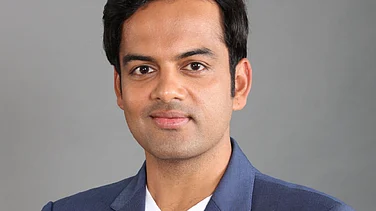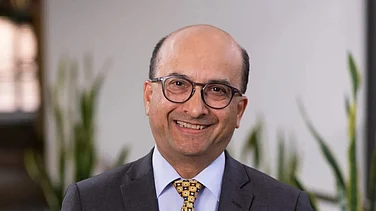Businesses across the globe are increasingly aiming to enhance sustainable practices. Indian companies have a strong mandate in terms of Business Responsibility and Sustainability Reporting (BRSR) and brands like Nestle India are working extensively across their teams to adhere to the same.
The company has undertaken technological interventions like biodigestors to reduce carbon footprint in the dairy farms. By including such technology, the company aims to reduce greenhouse gas (GHG) emissions in their dairy supply chain. While ensuring compliance to Plastic Waste Management Rules, the company has also managed ~25,600 MT of plastic packaging.
Taking us through the embedded culture of sustainability in the company, Nestle India’s Director of Corporate Affairs and Sustainability Sanjay Khajuria shares with Outlook Business how the multinational company is trying to crack the sustainability puzzle in Indian context
As an MNC in India, how do you see stakeholders working towards sustainability?
Government, businesses, consumers, academicians, scientists, innovators need to all collaborate to address the climate emergency that is impacting the world. Nestlé India has a very strong focus on sustainability across its value chain and in addition to implementing best practices in our operation, we are also sharing these practices with our farmers, suppliers and partners.
How much of an effort does BRSR reporting take for a company like yours?
Writing the BRSR is an extensive process, that requires cross functional teams to work together and provide their inputs. For instance, team from engineering, supply chain, brands, CSR [corporate social responsibility] and human resources, legal team, IT and the communications team. The entire reporting exercise takes over six months.
India's agriculture sector is one of the highest contributors of emissions. Since farm sector comes under an FMCG company's scope 3 emissions, what efforts have you made to reduce carbon footprint of your suppliers?
Nestlé India engages with around 80,000 dairy farmers across Punjab, Haryana, Rajasthan and Jammu and Kashmir and is encouraging sustainable dairy farming practices by focusing on transformation and expansion, manure management, feed and fodder management, installation of biodigestors in dairy farms and tree plantation across the value chain. More than 5,50,000 trees were planted in dairy farms during the 15 months financial year ended March 31, 2024 to sequester carbon.
FMCG companies use a lot of plastic in packaging, what has been your company's efforts to reduce the usage of plastic in packaging?
Nestlé India has been a pioneer in responsibly managing an amount equivalent to the post-consumer plastic waste generated by our products. Since 2020, all our brands have remained plastic neutral. Recognising the importance of responsible design, we are transitioning its packaging to mono-material structures that are easy to recycle. We continue to reduce our reliance on virgin plastic by minimising its use where possible. Over the last two years, ~1,800 metric tonnes of virgin plastic have been eliminated through various initiatives such as replacing plastic straws, using recycled content in secondary packaging for NESCAFÉ and eliminating overwrap on nutrition products, etc.
We have also undertaken a unique initiative of making KITKAT and GERBER benches out of recycled plastic. We are fully compliant with Plastic Waste Management Rules and have registered as a 'Brand Owner,' ensuring 100 per cent adherence to regulations. We collaborate with government registered waste management agencies for the end-to-end management of plastic waste.
Under Extended Producer Responsibility (EPR), we responsibly managed ~25,600 MT of plastic packaging, which was above the EPR target of ~23,000 MT assigned by the Central Pollution Control Board.
What percentage of your profits goes into sustainable practices?
Sustainability is embedded into every aspect of our business and forms a part of our business strategy. Any business strategy and its execution has a sustainability lens underpinned by our commitment to strive for net zero by 2050. In India to achieve this we focus on climate change, packaging, responsible sourcing and water.
What breakthrough technology are you working on to reduce your carbon footprint drastically?
We have been using technology extensively to reduce carbon footprint. Here, we will focus on two specific examples—emission reduction in dairy farms through biodigestors and emission reduction in factories by using biomass boilers.
In the Biodigestor project, we are using technology to transform cattle manure into clean biogas, thus reducing the carbon footprint in dairy farms. Approximately 109 large biodigesters and 3,325 small biodigesters have been installed in 24 districts across Punjab and Haryana. Here we would like to give the example of Gurveer Singh a dairy farmer in Punjab and a valued partner of Nestlé India for over a decade. We installed a large biodigester on Gurveer's farm. This technology transforms manure into biogas, a clean and renewable energy source. The biogas is used as fuel in his kitchen and to run the generator in the farm. By using biogas, Gurveer and his mother are saving four cylinders equivalent LPG [liquified petroleum gas] as kitchen fuel per month.
In addition to the above we have installed biomass boilers in three major factories—Nanjangud, Moga and Sanand, which will mitigate GHG emissions by reducing furnace oil to produce steam.
We have a unique biomass boiler at Moga factory which will use briquettes made from stubble. We expect this will use 3–4 per cent of stubble in Moga district which would have been burnt otherwise.





























